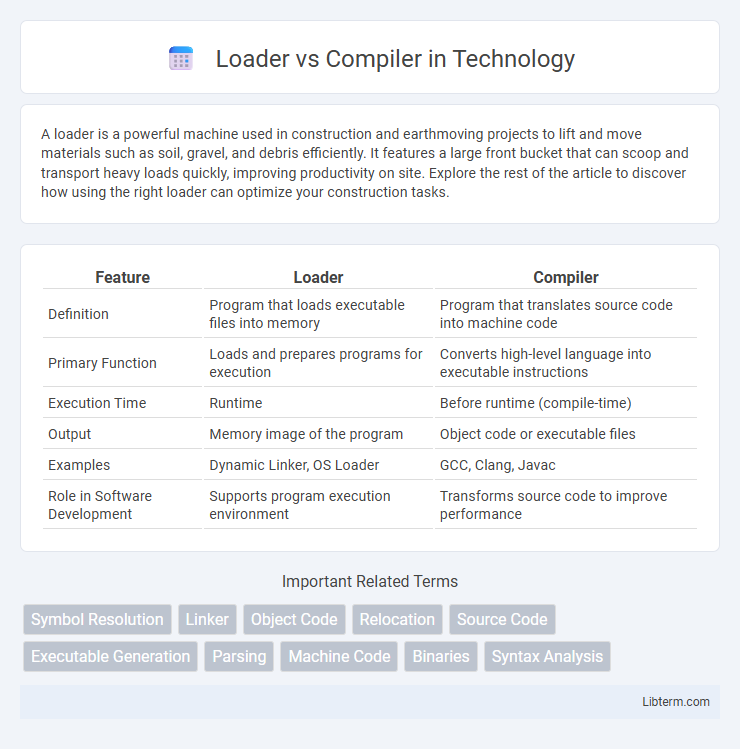A loader is a powerful machine used in construction and earthmoving projects to lift and move materials such as soil, gravel, and debris efficiently. It features a large front bucket that can scoop and transport heavy loads quickly, improving productivity on site. Explore the rest of the article to discover how using the right loader can optimize your construction tasks.
Table of Comparison
| Feature | Loader | Compiler |
|---|---|---|
| Definition | Program that loads executable files into memory | Program that translates source code into machine code |
| Primary Function | Loads and prepares programs for execution | Converts high-level language into executable instructions |
| Execution Time | Runtime | Before runtime (compile-time) |
| Output | Memory image of the program | Object code or executable files |
| Examples | Dynamic Linker, OS Loader | GCC, Clang, Javac |
| Role in Software Development | Supports program execution environment | Transforms source code to improve performance |
Introduction to Loader and Compiler
A loader is a system software responsible for loading programs into memory, preparing them for execution by allocating space and resolving addresses. A compiler translates high-level source code into machine code or intermediate code, enabling the program to be executed by the processor. Understanding the roles of loaders and compilers is essential for grasping how software is transformed from human-readable code to executable programs.
Definition of Loader
A loader is a system software component responsible for loading executable files into memory, preparing them for execution by allocating memory space and resolving addresses. It handles the relocation process by adjusting code and data references to match the actual memory locations assigned at runtime. Unlike a compiler, which translates source code into machine code, the loader operates after compilation, facilitating program execution.
Definition of Compiler
A compiler is a specialized software tool that translates high-level programming code into machine code or intermediate code that a computer's processor can execute directly. Unlike loaders, which handle the process of loading executable programs into memory, compilers perform syntax analysis, semantic analysis, optimization, and code generation to produce executable files. This transformation enables efficient program execution by converting human-readable source code into low-level instructions comprehensible by hardware.
Key Differences Between Loader and Compiler
A loader is a system component that loads executable files into memory, preparing programs for execution, while a compiler translates source code into machine code or intermediate code before execution. The loader deals with linking and relocation, ensuring the program's memory addresses are correctly mapped, whereas the compiler performs syntax analysis, optimization, and code generation during the build process. Loaders operate at runtime to manage program execution, whereas compilers function at compile-time to convert human-readable code into executable instructions.
Functions of a Loader
A loader is responsible for loading executable files into memory, preparing the program for execution by allocating memory space and resolving symbolic references. It manages the process of linking dynamic libraries and adjusts address pointers so the program runs correctly. Unlike a compiler that translates source code into machine code, the loader handles program initialization and execution environment setup.
Functions of a Compiler
A compiler translates high-level programming language code into machine code, enabling executable programs by performing lexical analysis, syntax analysis, semantic analysis, optimization, and code generation. It ensures the source code complies with language rules and optimizes performance before producing an object file or executable. Unlike a loader, which loads compiled code into memory for execution, the compiler's primary function is code transformation and optimization during the build process.
Loader vs Compiler: Workflow Comparison
Loaders and compilers play distinct roles in software development workflows, with loaders responsible for dynamically importing modules and transforming code at runtime, while compilers convert source code into executable machine code or intermediate representations before execution. Loaders, such as Webpack loaders, integrate into the build process to preprocess files like CSS or images, enabling modular development and immediate resource injection. Compilers, including GCC or Babel, analyze and optimize code syntax and semantics to generate efficient binaries or transpiled JavaScript, ensuring optimal performance and compatibility across environments.
Advantages and Disadvantages of Loader
A loader directly loads executable files into memory for immediate execution, providing faster startup times compared to compilers that translate source code to machine code beforehand. Loaders offer the advantage of simplicity and quicker program runs but lack the optimization capabilities of compilers, often resulting in less efficient code execution. However, loaders depend on pre-compiled binaries, limiting flexibility in dynamic code generation or optimization adjustments.
Advantages and Disadvantages of Compiler
Compilers translate entire source code into machine code before execution, resulting in faster runtime performance and better optimization opportunities, especially in languages like C and C++. However, compiling can be time-consuming and requires rebuilding the entire program after each change, which may slow down development cycles. Compiled programs are less flexible for debugging and platform independence compared to interpreted code or loader-based execution.
Loader vs Compiler: Use Cases and Applications
Loaders are primarily used in runtime environments to transform source code or assets into executable modules, enabling seamless integration within applications such as web development and module bundlers like Webpack. Compilers convert high-level programming languages into machine code or intermediate representations, optimizing performance and enabling execution on specific hardware or virtual machines, crucial for system software and application development. Loaders facilitate immediate code inclusion and asset handling, whereas compilers are essential for creating efficient, standalone executables tailored to diverse platforms.
Loader Infographic

 libterm.com
libterm.com